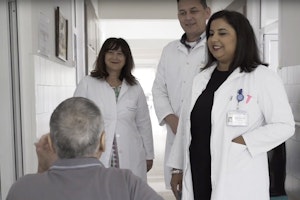Governments Should Follow Moldova’s Lead and Ensure Universal Access to Palliative Care
By Petru Culeac

In the 1990s, responding in part by the experience of seeing the deaths of both of his own parents from cancer, George Soros launched an effort to change the way the medical establishment responded to pain and terminal illness in the United States. This new palliative care approach involved making the control of pain a key priority of treatment and sought to address all needs—not just the purely medical—of a patient reaching the end of life or experiencing serious illness.
In the early 2000s, the Open Society Foundations expanded this work to other parts of the globe, including in the former Communist countries of East and Central Europe. In several of those countries, including Albania, Romania, Hungary, and Moldova, funding from Open Society and others, such as the Britain’s Sue Ryder Trust and Hospices of Hope, helped kick-start dramatic changes in public health approaches.
In Moldova, we have seen important progress, starting with the inclusion of the provision of palliative care as an element of the country’s overall public health strategy. Over the years, training and education programs for doctors and nurses through basic and continuous education have become mandatory; the number of palliative care providers has grown; and essential medicines that assist with pain management have become available for both adults and children.
Changes have been made to the national law regulating circulation of controlled substances and to the prescription medicine regulation, giving more people access to assistance with pain management.
In an important milestone just last year, the Moldovan parliament recognized palliative care as an essential health service to be included in its universal health care program, when members of parliament unanimously passed amendments to its health care law. These hard-won gains were the results of two decades of committed support from the Soros Foundation–Moldova along with long-lasting and productive cooperation with a wide range of stakeholders.
Over the years, much progress has been made—not just in Europe, but globally. In 2014, the World Health Organization passed its first ever resolution on palliative care, calling in member states to integrate palliative care and pain relief into their national health systems.
But there is still a long way to go. The Lancet medical journal has estimated that 61 million people face what it calls severe health-related suffering, related to diseases like cancer, HIV and AIDS, and others, every year. Each year, an estimated 40 million people are in need of palliative care, more than three quarters of these people live in low- and middle-income countries. Worldwide, only about 14 percent of people who need palliative care currently receive it.
So as this work continues, what can we learn from the achievements in Moldova—a country that, despite resource constraints, has achieved transformative public health gains?
- It is crucial to keep palliative care on the political agenda, and to champion the message that care should be available to all and free of charge, as a component of the right to health.
- Civil society groups need to seize opportunities for change, and to build broad coalitions and alliances, not just with health professionals, but with academics, government officials, parliamentarians, and others.
- Funders could do much more. Long-term commitment and investment from the donor community is crucial for obtaining results. The indicators used to measure success in health care projects often prioritize mortality rates and disability-adjusted life years. These may be good metrics for curative care, but this has led to palliative care being left in the shadows.
- Most of all, it’s up to governments in countries that have universal healthcare to make sure that palliative care is properly, and publicly, funded as an integral part of the domestic health system.
Numerous studies have shown that palliative care results in better outcomes, including a higher quality of life for patients, better management of pain and symptoms, and lower health care costs as a result of fewer hospitalizations. Outcomes for those living with life-limiting communicable and noncommunicable conditions improve, whenever this is the case.
Everyone, regardless of their diagnosis, has a right to universal access to palliative care without financial or geographic barriers, and irrespective of their underlying disease. We all deserve to live, and when that day comes, depart with dignity.
Petru Culeac is executive director of Soros Foundation–Moldova.

